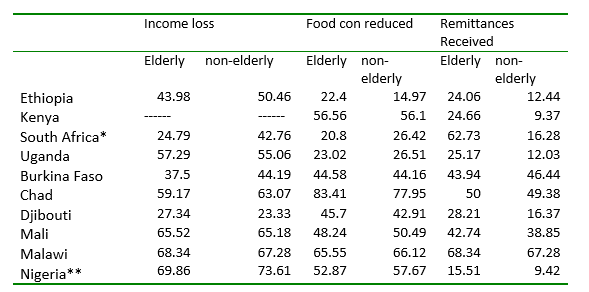COVID-19 has brought the greatest challenge on the economic crisis of the African elderly population. The situation worsened because of limited preparedness to prevent both the psychological and economical impacts of COVID especially on the elderly. Since social distancing and isolation are not the social and cultural norms common among the African population , the support the elderly received from the immediate families have been substantially minimized and compromised because of the pandemic. The pandemic hit the elderly the most both in terms of high fatality rates and incomes lost. This brief highlights evidence from high frequency phone surveys in some countries indicated that the elderly experienced as much if not more income loss and food shortages during the pandemic. The job loss, to those who remained active in the labor market was significant.
The elderly generally faced either similar or higher loss in income, and experienced reduction in food consumption as a result. For instance, over 60% of the elderly in Chad, Mali, Malawi Nigeria and Uganda suffered income loss as a result of the pandemic, and same percentage also reduced food consumption, risking hunger (Table 1). In addition, most elderly received higher remittances from families and friends to cope with the challenges posed by the Covid-19 pandemic. This could have been the situation even prior to the pandemic noting that cash transfers whether from individuals or governments (as in the case of South Africa) tend to go from the younger to the older generation. Still despite efforts made through cash transfers to help the elderly, it is shocking to note that significant proportion of the elderly had to reduce food consumption to cope with the pandemic.
Table 1: Income loss, reduction in food consumption and social support among the ageing population during Covid-19 pandemic

Note: The table reports results from high frequency household surveys conducted over a telephone. * is direct transfer from government, **Computation for Nigeria to be completed
Source: author’s computation based on high frequency household survey data (World Bank)
The elderly in Africa continued to be active in the labor market despite their age as shown in Table 2. The pandemic hence affected their job prospects at almost equal measures as other age groups This has caused most elderlies to suffer from income losses in almost comparable degree. For instance, in Mali, Malawi and Nigeria, the income loss and subsequently the food shortage has been comparable with the non-elderly.
Table 2: Job loss by the elderly as a result of Covid-19 pandemic in Africa

Source: author’s computation based on high frequency household survey data (World Bank)
This brief is based on the author’s contribution to a policy paper “Policy Brief on Ageing, Social Protection, and Covid-19 pandemic in Africa”, September 2021, Gender, Poverty and Social Policy Division, UNECA
- The ageing population of Africa is increasing, so it’s suffering - October 10, 2021
- Are social protection programs effective in caring for the elderly in Africa? - October 5, 2021
- For whom the bell tolls? Social Protection in Africa during Covid-19 pandemic - September 30, 2021

